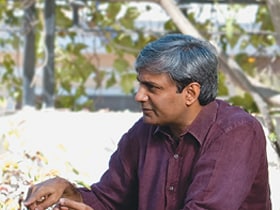
Have You Paid A Bribe?
Corruption gums up the workings of a market economy—making legal activity less efficient, degrading the quality of institutions, and disadvantaging those who would behave ethically. A website in India aims to use the tools of social networking to start the wheels of positive change
One sign of the pervasiveness of corruption in India is this statistic: 54% of Indians paid a bribe in the last year, according to a 2010 study by Transparency International. "Day-to-day corruption is eating away at people's ability to live life in a normal way," says Ramesh Ramanathan '91, co-founder of the governance-focused nonprofit Janaagraha.
"It has become so much a part of day-to-day life in India that everybody is in some sense either a perpetrator or a victim or a beneficiary," says Ramanathan. Janaagraha decided to take a business perspective on the petty corruption that citizens encounter when they seek a driver's license or a land deed. The organization soon realized it needed information. How often are people asked for bribes? Can they avoid paying by going to the next window or another office elsewhere in the same city? And if they must pay, what's the going rate?
Janaagraha decided to capitalize on the commonness of the practice by creating a website where people could report their experiences and discover what others have gone through. They named it I Paid a Bribe (ipaidabribe.com). "If you go from saying ‘Don't pay a bribe' to ‘I paid a bribe,' then a lot of things happen," Ramanathan says. Bringing transparency to the illicit market by crowdsourcing data has already started to reveal which cities, departments, and offices are most corrupt.
In the six months since the website's launch in September 2010, it has received more than a quarter million hits and more than 5,000 reports. "We have begun to score some victories with government departments," Ramanathan says. "The head of the Road Transport Organization, which issues drivers' licenses and vehicle registrations, saw that the department had the second-highest number of incidents of reported bribes in Bangalore. He wrote to us and said that he was embarrassed that they had such an ignoble reputation." Janaagraha consulted with the department to improve business processes. And posters presenting the Ten Commandments of Not Bribing have gone up in the public spaces. Those include options on how to report bribes or requests for bribes.
The country has had high-profile problems with corruption. India's hosting of the 2010 Commonwealth Games has resulted in arrests and ongoing investigations of organizers. State coffers lost out on some $40 billion when kickbacks allowed mobile phone spectrum licenses to be sold at a fraction of their actual value.
Janaagraha realized that the organization wasn't set up to battle these massive scandals. "What you might call wholesale corruption happens in many countries," Ramanathan says. "But it's far removed from people on a day-to-day basis and it's something they have no control over. The day-to-day transactions have become almost structural. Corruption is damaging the moral fiber of our society. If we can reverse that, it has the potential for a bubble-up effect."
The power of social media to advance social agendas has been much discussed since the wave of protests pushing for democratic change across the Arab world. "We are living through an explosion of creative activity in the civic arena that you might call civic hacking," says Micah Sifry, author of Wikileaks and the Age of Transparency, and co-founder of Personal Democracy Forum, which covers the impact of technology on politics.
"It's part of a larger trend of efforts by transparency and anti-corruption activists around the world who are coming up with dynamic, interactive ways of using the internet to shine light on a variety of problems that government has difficulty solving," Sifry says.
I Paid a Bribe is seeking to capture and redirect the frustration of the populace. Ramanthan says, "The proposition that we work on is that in a democracy, government reacts rather than leads, and it always reacts to public pressure for change. So the question therefore is, how do you accumulate sufficient public pressure? If we get one victory in drivers' licenses, that will then increase public energy, and that can hopefully get channelized into the next victory, and so on."
In setting up the website, the organization had to accept some risk, much like journalists promising to protect sources. Those who report paying a bribe on the website are admitting to having participated in an illegal activity; they are theoretically exposing themselves to prosecution. The website could get in trouble for disseminating the information. "It's a calculated gamble," Ramanathan says. The site doesn't require names and has promised that postings won't be tracked back to individuals.
Another fundamental choice the site made was to take an amnesty approach of not naming officials. "This is not about individual finger-pointing; it's about systemic issues," Ramanathan explains. "There is something wrong with the system, and so we don't really care if a particular officer has taken a bribe. What we do care about is that it doesn't repeat, and what rules of the game we need to change."
Ramanathan sees tremendous potential for I Paid a Bribe. "This is the emerging frontier in India—as internet penetration increases, as mobile telephony increases, as vernacular platforms increase, technology can be used and harnessed for social change."
[This article has been reproduced with permission from Qn, a publication of the Yale School of Management http://qn.som.yale.edu]





